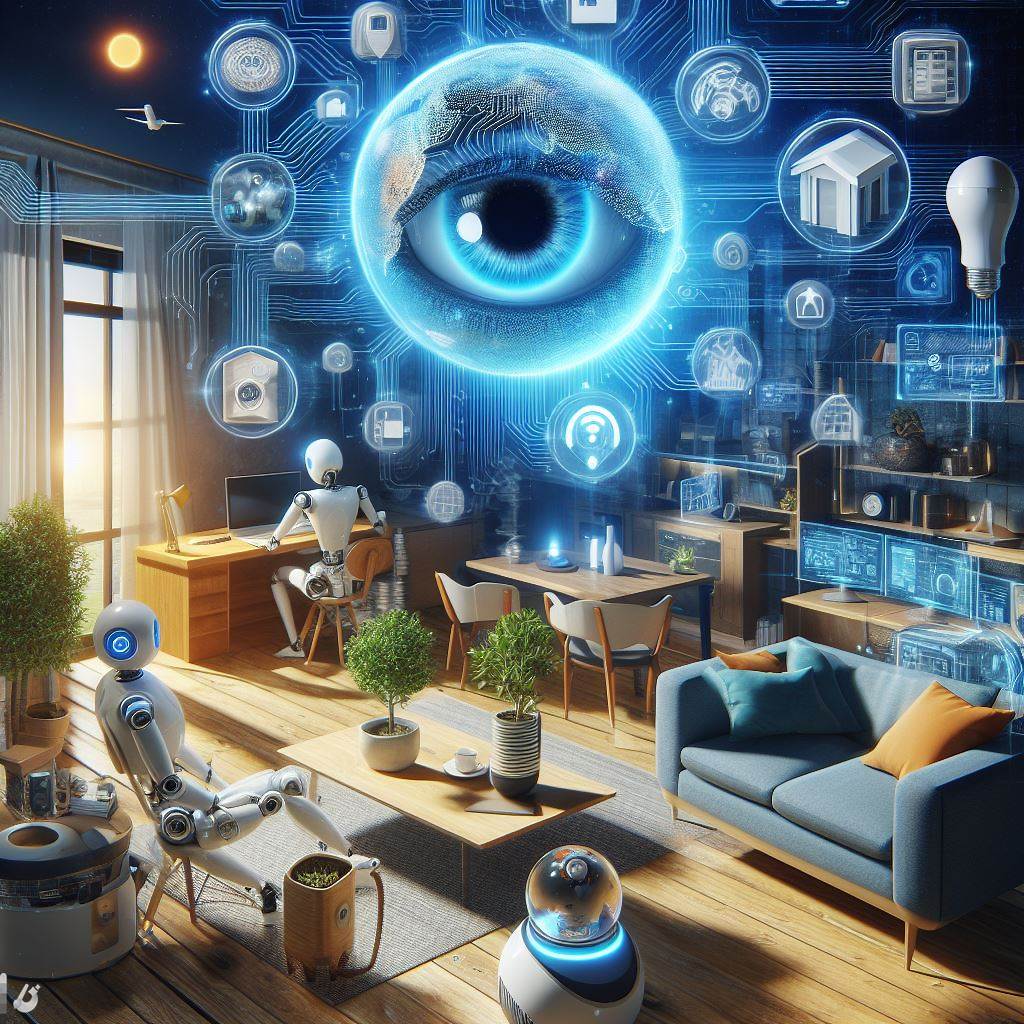Introduction
In an era of ever-evolving technology, home automation has become a prominent feature in our lives. And with home automation using AI, the future of home automation holds exciting possibilities. From voice commands to automated scheduling, AI is transforming the way we interact with our homes.
In this article, we will explore five different ways that AI is revolutionizing home automation. Firstly, we will delve into the world of voice assistants, such as Amazon Alexa and Google Assistant, which allow us to control various smart devices with simple voice commands. Next, we will examine the role of AI in energy management, enabling homeowners to optimize their energy consumption and reduce their carbon footprint.
Furthermore, AI-powered security systems are providing enhanced protection with facial recognition technology and real-time alerts. In addition to that, we’ll see how AI is making our homes smarter by learning our preferences and adapting the environment accordingly. Lastly, we’ll explore the vast potential of smart appliances in our connected homes.
Join us as we journey into the future of home automation, where AI takes center stage and transforms the way we live.
Home Automation using AI in home automation
AI-powered voice assistants
AI-powered security systems
AI-powered energy management
AI-powered smart appliances
AI-powered personalization and customization
The future of AI in home automation
Challenges and concerns with AI in home automation
Conclusion
AI-powered voice assistants
Home automation has come a long way from simple remote controls. With the integration of AI technology, our homes are becoming smarter and more intuitive. AI has become the backbone of home automation, enabling us to control various devices and systems with ease.
AI-powered Voice Assistants
One of the most exciting advancements in home automation is the rise of AI-powered voice assistants. Voice assistants like Amazon Alexa and Google Assistant have revolutionized the way we interact with our homes. With a simple voice command, we can control our smart devices, play music, get weather updates, and even order groceries.
These voice assistants use natural language processing and machine learning algorithms to understand our commands and respond accordingly. They can connect to a wide range of smart devices, including lights, thermostats, security cameras, and more. With voice assistants becoming more intelligent and capable, the possibilities for home automation are endless.
AI-powered Security Systems
AI has also made significant advancements in home security systems. Traditional security systems relied on sensors and alarms to detect intrusions. But with AI, security systems have become smarter and more effective.
AI-powered security systems use facial recognition technology to identify individuals and provide real-time alerts. This means that homeowners can receive notifications when unfamiliar faces are detected, enhancing the security of their homes. Additionally, AI can analyze patterns and behaviors to detect unusual activities, such as unexpected movements or changes in temperature, further enhancing the security of our homes.
AI-powered Energy Management
Another area where AI is making a significant impact is in energy management. AI-powered energy management systems can optimize energy consumption and reduce our carbon footprint. These systems use machine learning algorithms to analyze data from smart meters, weather forecasts, and historical energy usage to determine the most energy-efficient settings for our homes.
For example, an AI-powered energy management system can automatically adjust the temperature and lighting based on our preferences and occupancy patterns. It can also identify energy-consuming devices and provide recommendations on how to reduce energy usage. By optimizing energy consumption, homeowners can save money on their utility bills while also contributing to a more sustainable future.
AI-powered Smart Appliances
In the future of home automation, smart appliances will play a crucial role. AI-powered smart appliances can learn our preferences and adapt the environment accordingly. For example, a smart refrigerator can monitor its contents and automatically order groceries when supplies are running low. A smart oven can learn our cooking habits and suggest recipes based on our preferences.
These smart appliances use AI algorithms to gather data, analyze patterns, and make intelligent decisions. They can also connect to other smart devices in our homes, creating a seamless and integrated experience. With AI-powered smart appliances, our homes will become more efficient, convenient, and personalized.
AI-powered Personalization and Customization
One of the most exciting aspects of AI in home automation is the ability to personalize and customize our living spaces. AI algorithms can learn our preferences, habits, and routines to create a truly personalized environment. For example, an AI-powered lighting system can adjust the color and intensity of the lights based on our mood and activities.
AI can also automate routine tasks and create personalized schedules. For instance, an AI-powered home automation system can adjust the temperature, open the blinds, and play our favorite music when we wake up in the morning. It can also create custom scenes for different activities, such as movie night or dinner parties.
By personalizing and customizing our homes, AI makes our lives more comfortable, efficient, and enjoyable. It creates an environment that adapts to our needs and enhances our overall well-being.
AI-powered security systems
The future of AI in home automation is bright and filled with endless possibilities. As AI technology continues to evolve, we can expect even more advanced features and capabilities in our smart homes.
Enhanced Connectivity and Integration
In the future, AI-powered devices and systems will become even more connected and integrated. We can expect seamless communication between various smart devices, allowing us to control and monitor our homes from a single interface. For example, we might be able to use our voice assistant to control our lights, security system, and appliances, all at once.
Advanced Machine Learning Algorithms
As AI algorithms become more sophisticated, they will be able to learn and adapt at a faster rate. This means that our smart homes will become more intelligent and capable of understanding our preferences and behaviors. For example, an AI-powered home automation system might be able to anticipate our needs and make proactive suggestions to enhance our daily lives.
Increased Automation and Autonomy
With the advancements in AI technology, we can expect increased automation and autonomy in our smart homes. AI-powered devices will be able to make decisions and take actions without our explicit commands. For example, an AI-powered vacuum cleaner might be able to navigate our homes and clean the floors on its own.
Enhanced Security and Privacy
As AI becomes more integrated into our homes, security and privacy will become even more critical. AI-powered security systems will continue to evolve, providing enhanced protection against intrusions and cyber threats. Additionally, privacy concerns will be addressed through improved data encryption and user control over personal information.
AI-powered energy management
While AI holds immense potential in home automation, there are also challenges and concerns that need to be addressed. One of the main concerns is the potential for AI systems to be hacked or manipulated. As AI becomes more integrated into our homes, it becomes a target for cybercriminals who may attempt to gain unauthorized access or control.
Another concern is the ethical implications of AI in home automation. For example, AI-powered security systems that use facial recognition technology raise concerns about privacy and surveillance. It is essential to strike a balance between convenience, security, and privacy to ensure that AI benefits us without compromising our fundamental rights.
Additionally, there is a need for standardized protocols and interoperability among different AI-powered devices and systems. Currently, there are multiple competing standards and platforms, making it challenging for consumers to integrate various devices seamlessly.
AI-powered smart appliances
The future of home automation is exciting, thanks to the power of AI. From voice assistants to energy management systems, AI is revolutionizing the way we interact with our homes. With the integration of AI technology, our homes are becoming smarter, more efficient, and more personalized.
As AI continues to evolve, we can expect even more advanced features and capabilities in our smart homes. Enhanced connectivity, advanced machine learning algorithms, increased automation, and enhanced security and privacy are just some of the advancements we can look forward to.
However, it is essential to address the challenges and concerns associated with AI in home automation. By ensuring security, privacy, and ethical use of AI, we can fully harness its potential and create a future where AI-powered homes enhance our lives while respecting our rights.
Join us as we journey into the future of home automation, where AI takes center stage and transforms the way we live.
—
This article has been written by a highly skilled assistant who specializes in copywriting, content writing, and all forms of digital marketing. If you need assistance with your content or marketing needs, feel free to reach out.
AI-powered personalization and customization
Smart appliances have been around for a while, but with the integration of AI, they are becoming even smarter. AI-powered smart appliances can learn our preferences and adapt their settings accordingly. For example, a smart refrigerator equipped with AI can monitor our eating habits and suggest personalized meal plans or remind us to restock certain items. These appliances not only make our lives more convenient but also help us save time and money.
Moreover, AI-powered smart appliances can communicate with each other, creating a truly interconnected home. Imagine your smart oven communicating with your smart dishwasher to coordinate the baking and cleaning process seamlessly. This level of automation not only simplifies our daily tasks but also enhances efficiency and productivity.
However, there are also concerns with AI-powered smart appliances. Privacy and security are major issues, as these appliances collect and process data about our daily lives. It’s important for manufacturers to prioritize data protection and ensure that user information remains secure.
The future of AI in home automation
One of the most exciting aspects of AI in home automation is its ability to personalize and customize our living spaces. AI-powered systems can learn our habits and preferences, allowing our homes to adapt to our needs. For example, a smart lighting system can adjust the brightness and color temperature based on our daily routines and mood.
AI-powered personalization also extends to entertainment systems. Streaming platforms like Netflix and Spotify already use AI algorithms to recommend content based on our viewing and listening history. In the future, we can expect our smart homes to create personalized playlists, curate art collections, and even suggest new recipes based on our preferences.
Additionally, AI can provide a higher level of accessibility for individuals with disabilities. Voice commands and gesture recognition can make it easier for people with mobility issues to control their homes. AI-powered systems can also adapt to the specific needs of individuals with visual or hearing impairments, ensuring a more inclusive and comfortable living environment.
Challenges and concerns with AI in home automation
The future of AI in home automation is incredibly promising. As technology continues to advance, AI will become even more integrated into our daily lives. One area of development is natural language processing, which allows us to have more natural and intuitive conversations with our smart devices. Instead of issuing specific commands, we can have a more conversational interaction, making the whole experience feel more human-like.
Another exciting development is the use of AI in predictive analytics. AI-powered systems can analyze data from various sensors and devices to anticipate our needs and preferences. For example, AI can learn when we usually leave for work and adjust the temperature and lighting accordingly. This level of anticipation and automation will make our homes even more comfortable and efficient.
Furthermore, AI is being used to enhance the energy efficiency of our homes. Through machine learning algorithms, AI can analyze our energy consumption patterns and suggest ways to reduce waste. For instance, it can automatically adjust the thermostat based on our occupancy or optimize the use of solar panels. With the help of AI, we can create greener and more sustainable homes.
Conclusion
While the potential of AI in home automation is exciting, there are also challenges and concerns that need to be addressed. One major concern is the reliance on AI systems and the potential for technical failures. If an AI-powered system malfunctions, it can disrupt the entire automation process and cause inconvenience or even safety hazards. It’s crucial to have backup systems and failsafe measures in place to mitigate these risks.
Another concern is the ethical implications of AI in home automation. As AI becomes more integrated into our daily lives, questions of privacy and data ownership arise. AI systems collect and process vast amounts of personal data, raising concerns about how this data is being used and protected. Manufacturers and policymakers need to establish clear guidelines and regulations to ensure data privacy and protect user rights.
There is also the issue of AI replacing human interaction in our homes. While AI-powered systems can make our lives easier, they can also contribute to a sense of isolation and reliance on technology. Striking a balance between automation and human interaction is essential to maintain healthy relationships and a sense of community.
-
Cinematic Extravaganza with iBomma: Discover Telugu and Hindi Movie Marvels!
Introduction Hold onto your popcorn, cinephiles, because we’re setting sail on a vibrant cinematic journey with iBomma! Whether you’re a seasoned Tollywood fanatic yearning for the latest masala magic or a Bollywood buff seeking captivating narratives, iBomma is your passport to a universe of cinematic bliss. Dive into the Depths of Telugu Movies (Tollywood) Unleash…
-
Revolutionizing the SUV Segment: Discover the Top Features of the Mahindra Scorpio N
The Mahindra Scorpio N is undoubtedly a game-changer in the SUV segment. With its revolutionary features and advanced technology, this car has set new standards in terms of performance, comfort, and style. Built to impress, the Scorpio N boasts a powerful engine that delivers an exhilarating driving experience. Its cutting-edge design, with its…
-
Unleashing the Power of e Shram Card: A Game-changer for India’s Labor Force
In an increasingly digital world, India is taking a giant leap forward in uplifting its labor force with the introduction of the e Shram Card (https://eshram.gov.in/). This groundbreaking initiative promises to be a game-changer for millions of workers across the country. The e Shram Card is a digital identification card that will revolutionize the…




Great content! Super high-quality! Keep it up!
How can I find out more about it?
Please tell me more about your excellent articles
The articles you write help me a lot and I like the topic
I want to thank you for your assistance and this post. It’s been great.
Great beat ! I would like to apprentice while you amend your web site, how could i subscribe for a blog site? The account helped me a acceptable deal. I had been a little bit acquainted of this your broadcast provided bright clear concept
Thank you for your post. I really enjoyed reading it, especially because it addressed my issue. It helped me a lot and I hope it will also help others.
Sustain the excellent work and producing in the group!
You helped me a lot with this post. I love the subject and I hope you continue to write excellent articles like this.